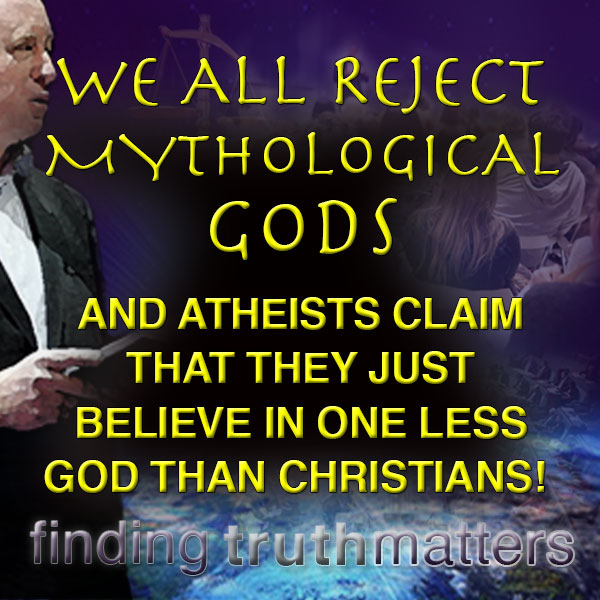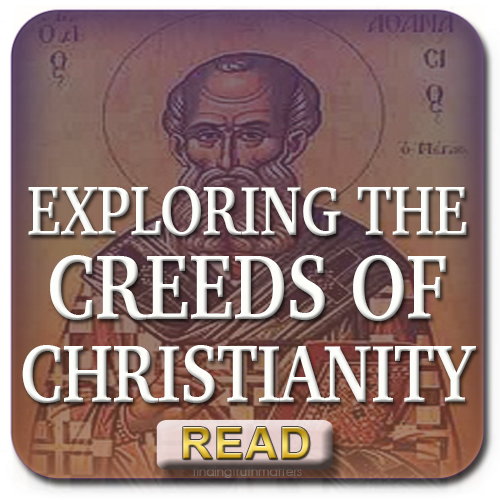
by Dr. Andrew Corbett | Dec 6, 2018 | Apologetics
Some atheists claim that the only difference between them and Christians, is that they believe in one less god than Christians. They, like Christians, don’t believe in the ‘gods’ of Ancient Rome. Christians therefore, on this premise, are ‘atheists’ (for not believing in the existence of the Roman gods). Interestingly, this was the same accusation that the ancient Romans actually levelled at the early Christians as well – for the same reason as modern atheists. After all, these Romans pointed out, Christians didn’t believe in all the gods which the Romans venerated – Mars, Hermes, Zeus, Jupiter, and so on.
But the reason that Christians reject the gods of mythology, yet accept the God of the Bible, is the same reason: the evidence. There is no evidence for the mythological gods of the Greeks and Romans, and there is sufficiently verifiable evidence for the God of the Bible!

by Dr. Andrew Corbett | Nov 19, 2018 | Theology
I have a son who thinks he is the world’s best speller. It’s actually become a family joke just how bad his spelling is though. In his 5th year of elementary school, he couldn’t see the irony of how he had labelled his Spelling Workbook – ‘Speeling.’ Even now, at pre-tertiary level, Tiger (my son) still struggles with spelling. I have to read and re-read what he has written in order to figure out which word he is actually trying to use.
So if you saw the mis-spelt word b a i r in your child’s schoolwork how would you determine what he or she meant? Did he/she mean bare or bear? If your child meant bear, which bear did they mean? After all, if they meant bare they could have meant: empty (the cupboard was bare), or: naked (bare shoulders sometimes need covering), or, they could mean: show (bare one’s teeth). But then, if they meant bear they could mean: an animal, or to turn (bear left), or to carry (bear a burden). The only way you could determine what your child means would be to read the context of what they had written. This is because words are generally equivocal- the context determines it’s meaning.

by Dr. Andrew Corbett | Oct 24, 2018 | Culture
When the Apostle Paul arrived in Macedonia in the mid 50s AD, the seeds of the Gospel were sown in Europe. Little could he have imagined that within a few centuries the leader of the very Empire which would do its utmost to destroy the Church would profess Christ as his Lord. But neither could he have foreseen how distorted his gospel, and those who claim to represent it, would become – or could he?

by Dr. Andrew Corbett | Oct 21, 2018 | Theology
The Doctrine of Perspicuity says that God has given mankind His message in the Scriptures which can be clearly understood. That is, if a person was just to read the Bible they would understand its message. But there is a counter-doctrine known as the Doctrine of Perspicacity which says that mankind’s sinful heart will always tend to distort what God is clearly saying. This is why the formation of Creeds was both necessary and possible.
At the establishment of the Church in the first century, copies of the Scriptures were not readily available. The truth of Scripture was encapsulated into short memorable sayings. There are traces of these credal statements to be found in the New Testament. Examples are found in First Corinthians 15:3-4, First Timothy 1:15, Second Timothy 2:11, and Titus 3:4-7.

by Dr. Andrew Corbett | Aug 22, 2018 | Theology
“Christ Alone!” The cry of the Reformers was that salvation was revealed in the Scriptures alone (Sola Scriptura) which is based on the work of Christ alone.
…that same veil remains unlifted, because only through Christ is it taken away.”
Second Corinthians 3:14
When we say ‘Christ alone’, we are emphatically stating that Scripture reveals salvation in and through no one other than Christ.





